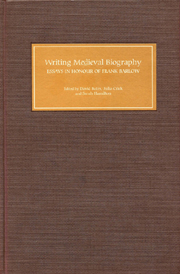Book contents
- Frontmatter
- Contents
- Preface
- List of Abbreviations
- Introduction
- 1 Did Charlemagne have a Private Life?
- 2 Bones for Historians: Putting the Body back into Biography
- 3 ‘Carriers of the Truth’: Writing the Biographies of Anglo-Saxon Female Saints
- 4 Alfred and his Biographers: Images and Imagination
- 5 Re-Reading King Æthelred the Unready
- 6 Writing the Biography of Eleventh-Century Queens
- 7 The Flemish Contribution to Biographical Writing in England in the Eleventh Century
- 8 The Conqueror's Earliest Historians and the Writing of his Biography
- 9 Secular Propaganda and Aristocratic Values: The Autobiographies of Count Fulk le Réchin of Anjou and Count William of Poitou, Duke of Aquitaine
- 10 Reading the Signs: Bernard of Clairvaux and his Miracles
- 11 Arnulf's Mentor: Geoffrey of Léves, Bishop of Chartres
- 12 The Empress Matilda as a Subject for Biography
- 13 The Gesta Stephani
- 14 Writing the Biography of Roger of Howden, King's Clerk and Chronicler
- 15 Writing a Biography in the Thirteenth Century: The Construction and Composition of the ‘History of William Marshal’
- 16 The Strange Case of the Missing Biographies: The Lives of the Plantagenet Kings of England 1154–1272
- Index
15 - Writing a Biography in the Thirteenth Century: The Construction and Composition of the ‘History of William Marshal’
Published online by Cambridge University Press: 12 September 2012
- Frontmatter
- Contents
- Preface
- List of Abbreviations
- Introduction
- 1 Did Charlemagne have a Private Life?
- 2 Bones for Historians: Putting the Body back into Biography
- 3 ‘Carriers of the Truth’: Writing the Biographies of Anglo-Saxon Female Saints
- 4 Alfred and his Biographers: Images and Imagination
- 5 Re-Reading King Æthelred the Unready
- 6 Writing the Biography of Eleventh-Century Queens
- 7 The Flemish Contribution to Biographical Writing in England in the Eleventh Century
- 8 The Conqueror's Earliest Historians and the Writing of his Biography
- 9 Secular Propaganda and Aristocratic Values: The Autobiographies of Count Fulk le Réchin of Anjou and Count William of Poitou, Duke of Aquitaine
- 10 Reading the Signs: Bernard of Clairvaux and his Miracles
- 11 Arnulf's Mentor: Geoffrey of Léves, Bishop of Chartres
- 12 The Empress Matilda as a Subject for Biography
- 13 The Gesta Stephani
- 14 Writing the Biography of Roger of Howden, King's Clerk and Chronicler
- 15 Writing a Biography in the Thirteenth Century: The Construction and Composition of the ‘History of William Marshal’
- 16 The Strange Case of the Missing Biographies: The Lives of the Plantagenet Kings of England 1154–1272
- Index
Summary
THE WRITING of biography was not a major medieval preoccupation; unfortunately no-one told the biographer of William Marshal this when he began his work in 1224. Which is just further evidence for me that historians are born, not made. We have to begin with the Marshal biography's uniqueness. There is no trace of any other twelfth- or thirteenth-century vernacular biography, in prose or verse. For the History there is no question of its genre … or barely any. It is unique in its survival, but I believe it was unique in its own day too. There was of course a contemporary Latin genre of biography with a pedigree going back to Suetonius, and there are a number of examples of it from the Marshal's own lifetime. But the biographer of William Marshal did not live in the mannered world of the Twelfth-Century Renaissance; his work was barely influenced by its conventions.
The only genre that did unmistakably influence the author was that of the roman d'aventure. This is the romance, sometimes a generational romance, based on the life-story of an imaginary or pseudo-historical hero. It is a genre which surfaces in northern France in the second half of the twelfth century as a mannered development from the more formidable epic tales such as those of William of Orange or Raoul de Cambrai. Such works include Chrétien de Troyes' Cligés, Walter of Arras's Ille et Galeron, and the curious Anglocentric romance of Gui of Warwick, all composed during the period from 1170 to 1200.
- Type
- Chapter
- Information
- Writing Medieval Biography, 750–1250Essays in Honour of Frank Barlow, pp. 221 - 236Publisher: Boydell & BrewerPrint publication year: 2006

